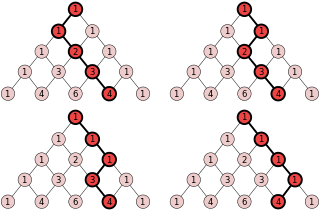That's a lot of squares

If are positive integers that satisfy the equation above, determine the minimum value of .
Image Credit: Wikimedia R. A. Nonenmacher
The answer is 300.
This section requires Javascript.
You are seeing this because something didn't load right. We suggest you, (a) try
refreshing the page, (b) enabling javascript if it is disabled on your browser and,
finally, (c)
loading the
non-javascript version of this page
. We're sorry about the hassle.
Consider two sets of n objects. To choose n of these objects, we can simply write this as ( n 2 n ) .
However, we may also consider including 0 in what we choose from one group and excluding 0 from the other group, including 1 and excluding 1 , etc. Thus, in total we have ∑ j = 0 n ( j n ) 2 which must be equal to ( n 2 n ) .
As n = 1 0 0 , the answer is ( 1 0 0 2 0 0 ) so m + n = 3 0 0 . (We may not write this number as a binomial coefficient so that m + n is smaller)